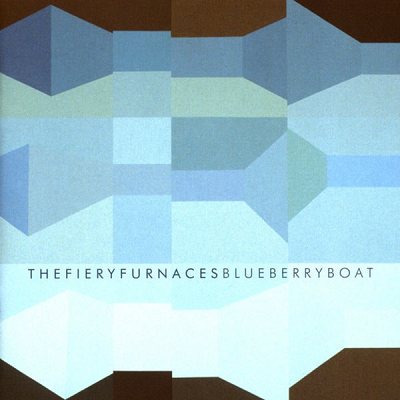9. The Fiery FurnacesBlueberry Boat

I think The Fiery Furnaces are really underrated. They’ve got a really hardcore fanbase, but I don’t think they get enough credit outside of that, which is weird because they’re clearly very good musicians and innovative songwriters. I don’t know if people just find them annoying, or their overall sound offputting? I love Eleanor Friedberger’s voice, but some people can be like ‘She hasn’t got a massive range, therefore I don’t care’ – even though she’s really distinctive, you instantly know it’s her. Matthew Friedberger has a demented approach to music and writing and making everything as sonically mad as possible. His solo stuff is a lot of instrumental epics that are sometimes borderline unlistenable, whereas Eleanor’s solo stuff is more melodic and traditional. I like when the worlds of accessibility and innovation meet, and I think the compromises that they make to get there are great.
I’ve bought and loved all of their albums, but there’s a bunch of reasons why Blueberry Boat is my favourite, and one is that it’s simply got the most amount of great songs on it. Any album that’s one of your favourites, that’s really what it boils down to. There’s not a song I don’t like on Blueberry Boat. I feel like every song needs to be on there, which maybe can’t be said of every Fiery Furnaces album. There’s a nice mix of these long, epic songs that are often shaggy dog tales, and then these short catchy ones that sound as close to pop singles as Fiery Furnaces can get. They were so focused on melody here too. There are songs with multiple sections that are structured almost like prog songs, but instead of prioritising the technicalities of going into a new time signature and doing overlapping sections that go in rounds, they’ve gone: this is the melody for this section, and this is how we present it. They’re really thinking about catchiness all the way through. So you might have a nine minute song, but it’s got loads of different hooks in it that are really infectious and that you want to revisit.
What I love about this album in particular is that so many of the long songs have these really abrupt changes in them, where they might change tempo or key and it sounds like it could be a completely different song. It’s like if the Abbey Road medley was just one track and The Beatles said, ‘This is just one song actually.’ Every song is like a medley of these other tracks, and I like that they don’t try to transition from one idea to another in a smooth way – they just very abruptly change in a way that’s still able to make sense. A lot of the time they’re telling these really long surreal stories, so it was like a chapter change almost – this is the next part of the story, so we’re gonna do a completely different instrumental for that. But then sometimes they’d bring back the same motifs – a little keyboard melody in the background or something – and present it in a different way. They never fully disappeared up their own arses with it, because Matthew Friedberger had that thing of going ‘let’s go into this mad world’ and Eleanor Friedberger going ‘other people are going to listen to this, so let’s try to remember that and give them something that they can always latch onto.’
Everything that I like about The Fiery Furnaces is on the album – their far-fetched absurdities and the relatable side of them as well. They can go from being very surreal to very personal, like there’ll be quite a grounded story of a break-up or divorce and then another song where someone’s looking for their dog and their dog ends up becoming a Christian. The front cover is, I guess, meant to be the sea. Iit’s all these different block shades of blue, and similarly the sound of the album has these really big, block colours all the way through. The sounds of the keyboards and the guitar are quite dirty and very bold. Nothing is really trying to hide in the background. And Eleanor’s vocal is very vulnerable. She doesn’t do anything to try to disguise or alter it, she’s just singing in her natural voice and embracing that it’s not like anyone else’s. Sometimes Matthew sings as well and he’s got a similar vibe, and often they use those dual vocals to tell different sides of a story or take it in turns to be the lead character or someone else talking to the lead character.
I think it was the album where The Fiery Furnaces really let themselves be the purest version of that band. There are other albums where they’re kind of introducing themselves a bit more and trying to be a bit more of an indie band so people won’t tell them to get lost, but they don’t really commit to being The Fiery Furnaces as much as they do on this album. When I discovered this album, I was in a band that really wanted to take melody and make that the main part of every song but also be really weird. We were anti-self indulgence, but also wanted to be inventive. So hearing a band like The Fiery Furnaces that had succeeded in doing that was really encouraging. It was good to listen to them and go, ‘Well they’ve achieved this thing on a massive scale, so maybe there’s hope’. In the end there wasn’t, but still.


